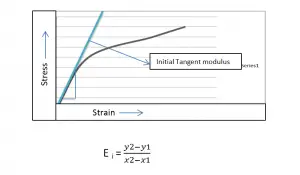Elastic modulus of concrete is not easy to determine, because of non-linear behavior of concrete. Concrete is very strong in compression but very weak in tension and this is the main reason for non-linear behavior of concrete.
To overcome this effect, concrete is use with reinforcing bars, which changes the behavior of concrete from brittle to ductile behavior. when this case happens then concrete will show strains before rupture.
Therefore, when applying modulus of elasticity to concrete, some cautions must be considered. As we know, elastic modulus is the tangent at that point on the curve. So there are different moduli, which will be used for determining behavior of concrete, depending upon the conditions these every moduli will give, different values. These are;
- Initial tangent modulus
- Tangent modulus
- Secant modulus
- Chord modulus
Initial Tangent Modulus Of Concrete
It is a slope to the curve from origin. Initial tangent modulus is applicable when material behaves linearly elastic. So in case when behavior of concrete will be linear then in that case elastic modulus of concrete will be evaluate by using initial tangent modulus. Concrete shows linear behavior only when it is being used as a reinforced concrete. When concrete have enough strength to resist strains that occurs in part of concrete, which is below neutral axis and in tension.
Procedure
Initial tangent modulus of a concrete specimen is very easy to determine. Follow the steps
- Draw a straight line to the curve that starts from origin.
- This line should touch with the curve at origin.
- Now draw a horizontal and vertical line on the curve where you want to find it.
- Measure the initial and final point on vertical and horizontal curve.
- Put value in formula below:
Mathematically ;
E i = (y2-y1)/(x2-x1)
- Where y2 and y1 are the stress values at two points
- Where x2 and x1 are the strains values at two point
